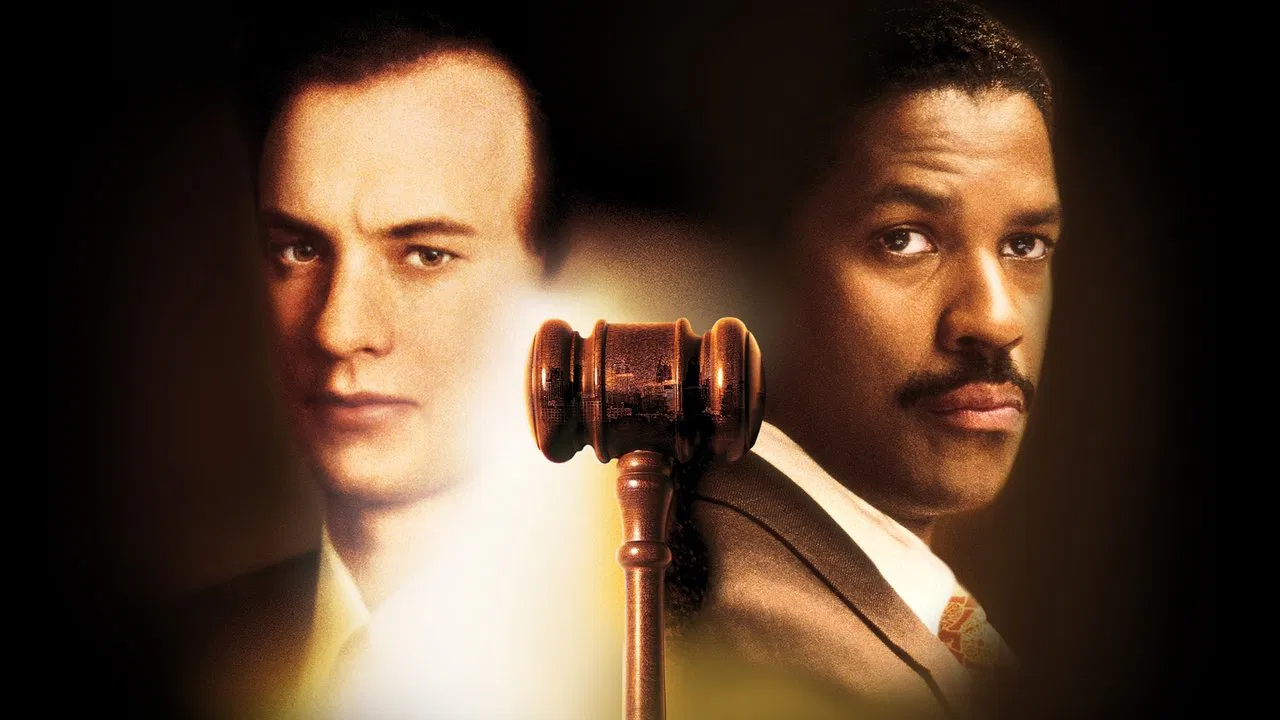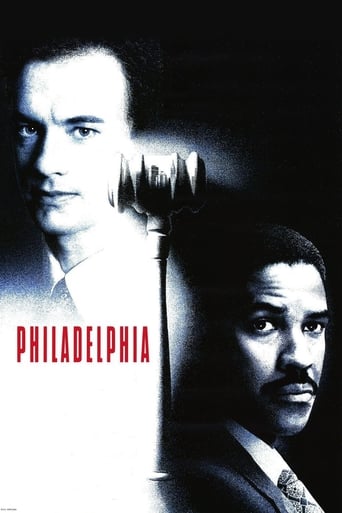

Jonathan Demme's 1993 Philadelphia portrays LGBTQ lives and characteristics as they exist almost exclusively in particularly white and upper- middle-class settings, but his focus on this racial and class faction realistically reflects, with the exception of sexuality, the life and perspective of a gay man living in such a socio-economic faction. To be gay in this film is to be either white and upper- middle-class or perfectly demonized, and the expression of homosexuality through sexual or desirous interaction is almost completely avoided in the film. Throughout the film, we encounter scenes and characters that portray the lives of gays and lesbians in the late 80's, but the films main focus is on the lives of upper- middle- class, white, gay men. Andrew Beckett is our main source of the "gay perspective," but his is limited by his class and race, and most importantly by the film's portrayal of his sexuality. When we first encounter Andy in his own home, it is clear that he associates with other gay, white men, and that he is relatively wealthy. His home is decorated with all kinds of art and the modern design and red color of the interior suggest his luxurious taste. There are very few moments in which Andy even displays intimacy towards his lover, Miguel, while Joe, a straight, black man, expresses his sexuality very openly with his wife in many scenes. Andy's sexuality is relegated to scenes outside of the purview of the film, and they are left for us to imagine, though the scenes in the film hardly allow us to do so. In this way, Tom Hanks rather poorly characterizes the gay man he was playing. He behaves as though he is closeted even when he is alone with his lover, and his sexuality is meant to be taken for granted, not realized or texturized by any realistic expression of desire. The qualities of Andy that we can consider "gay" are rather seen in certain stereotypical instances, such as when we see his flamboyantly colorful and artistic apartment and when he becomes lost in his favorite aria, dancing so indulgently that Joe feels uncomfortable and leaves. However, while Andy is not the most sexual gay man, his expressions of emotional affection with Miguel are touching and complicated. The cares and concerns of a gay man having contracted AIDS ware on their relationship in ways that are very clearly expressed by both Tom Hanks and Antonio Banderas. At one point, the two men are together in their apartment, and their conversation about Andy's impending death is touching, especially when Tom Hanks fearfully raises the pitch of his voice before deciding to throw a party at their apartment to do something special for Miguel. The emotions of their relationship are also complicated by Andy's apparent rendezvous with a man at the Stallion Theatre while engaging in a relationship with Miguel. They seem to be very fond of each other, but whatever impact Andy's infidelity had on their relationship may explain some of the distance in their sexual life as well as Miguel's somewhat disimpassioned goodbye to Andy at the end.If Andy's sexuality was coded by his love of opera and his flamboyant apartment, Miguel's was coded by his effeminate hysteria that seems to be linked with his Hispanic ethnicity. Miguel seems to be the stereotypical "hot-blooded Spaniard" that is only present to be the average, gay, white man's implied object of desire. Whenever they are in the hospital, Miguel is picking fights with all the doctors that are simply telling him the real nature of Andy's medical situation. At one point, he can be heard screaming, "It's not working!" to a group of doctors taking care of Andy, even to the point where one of the doctors must escort him out of the room. In his first scene he picks a fight with the doctor who tells him that Andy will need to have a colonoscopy done. Miguel's sexuality is limited in the film by his ethnicity in a way that seems to place him in the "woman's" role in his relationship with Andy.Miguel is not the only gay character of color in the film, as Joe is approached by a young black, gay man who wants to have sex with him. But this character is completely demonized in the film, and he represents the worst qualities of promiscuity and cockiness for which gay men, as Joe says, are often criticized by straight people. While there were plenty of other settings in which a gay character might have come onto Joe, this man approaches Joe in a pharmacy in a way that seems both unsolicited and inappropriate. The only good thing that we could say about this black gay character was that he was at least might have been going to the pharmacy to purchase condemns in order to practice safe sex. African American sexuality seems to have been, for both gay and straight black men, far more explicit and open than the sexualities of Andy and Miguel.While this film did well to capture the emotional connections between Andy and Miguel, its representations of sexuality with regard to race and ethnicity were particularly stereotypical and clearly Anglo-centric. Andy's homosexuality comes across as the most tolerable inasmuch as it is strictly coded, but firmly white and "masculine," with the exception of his brief moment of musical ecstasy.
... View MoreEverything is good and Andy (Tom) is a well respected and a great attorney but his life choose to take him on different path. As he falls from his highest point to the lowest he goes through many different things, both emotional and physical. Joe (Denzel) is attorney that is going to help him fight for his rights and prove that every man is equal and deserves a fair treating. It's incredible how powerful human beings are and same goes for Joe that in first was repelled by Andy and after seeing how he is ready to fight for himself, he decided to help him. Nerves and will that Andy put into this case were humongous and he brings every little emotion to screen and puts quite a experience for everyone watching. It shows how people are treated as not equal and that there are so much judgment in a lot of humans. Some of the scene were a little choppy and maybe tried to be bring some feeling but didn't quiet succeeded. Magnificent and moving performance by Tom Hanks which just left mouths shut and projected so much emotions, pain and fight for right things. Denzel also puts up a great performance and shows how humans are great and willing to fight for another. Musical piece that played is also very refreshing and amazing. 3.5/4
... View MoreThis movie made me cry like a baby when I first saw it, and still does now. It shows humanity, compassion, love and loss. People really can be beautiful if they try just a little. This ground-breaking, historically-significant, and realistic film from director, Jonathan Demme was one of the first major mainstream studio produce films to confront the AIDS issue from a medical, political, and societal point of view. Inspired by the true stories of attorneys Geoffrey Bowers & Clarence B. Cain, who, successfully sued the law firm that fired them in one of the first AIDS discrimination cases of wrongful dismissal. The movie loosely create a similar fictional story of a gay lawyer, Andrew Becket (Tom Hanks), having to sue his law firm over job discrimination when he got contracted with HIV/AIDS virus, with the help of a personal injury lawyer/friend, Joe Miller (Denzel Washington). Written by Ron Nyswaner, the movie had some controversy when it was first released, because how similar, the fictional story of Philadelphia was to Geoffrey Bowers. The family of Bowers, sued the writers and producers of the film, because of this, but it was quickly settled out of court. Although this movie was well-intentioned and compelling, it was also criticized by gay groups at the time, for the studio trying to attempted to block the casting of the HIV-positive, actor Ron Vawternote , until director Jonathan Demme pointed out how hypocritical this would be in the face of the film's message. Another thing, that got gay groups mad, is downplaying the affectionate romance between Andrew Becket and his lover, Miguel Alvarez (Antonio Banderas); as well, as not allowing the character to seem like anything less than the patron saint of AIDS victims. Yes, the character seem like American Boy Scout, however, in my opinion, I don't mind, the many compromises for mainstream audiences. After all, it got me, to watch the movie, when I wouldn't have watch it, otherwise. If anything, the main character of the film is arguably Joe, as he is the one to go through character development. It's nice to see him, warm up to the idea of helping Andrew, without feeling too preachy. Coming after HBO-TV docu-drama, 'And the Band Played On' about the growing AIDS crisis. The presence of two major American straight actors, Tom Hanks and Denzel Washington really helped to broaden awareness about the problematic disease. It also help bridged actor Tom Hanks' earlier career as a comedian to the more sober and serious side of his dramatic career. Tom Hanks is amazing in this role. The fact that Hanks lost 35 pounds and thinned his hair in order to appear sickly for the role, shows how committed he was, to the role. He really gave a deeply felt, carefully nuanced performance that deserves an Oscar. I'm pretty glad, he did win, Best Actor that year. I also love the fact that Hanks' Oscar acceptance speech, also help inspired the conflict in 1997's In & Out. It's also funny to hear that Denzel Washington, on the other hand, was asked to gain a few pounds for his role. Washington, to the chagrin of Hanks, who practically starved himself for the role, would often eat chocolate bars in front of him. Wow, what a joker! The drama also made effective use of the music. 'Philadelphia' has some of the best music, made for a film. Composer Howard Shore's 'Precedent" is still one of the purest track I have ever heard. Then, there are the fans and critic's favorite song, 'Streets of Philadelphia' by singer, Bruce Springsteen whom music video and the opening of the movie, able to shows the city in all its aspects — both the bright, shiny downtown landmarks, and the poor areas — minority, homeless, urban blight, and decay. While, it is a tear-jerking song. In my opinion, the song that deserve the Oscar, wasn't Bruce Springsteen, but music artist, Neil Young's song, 'Philadelphia'. In my opinion, the film without Neil Young's song, wouldn't have touched as many as it did, because of it. That song still makes me cry, when I hear it. It's such as a beautiful journey of emotional. Overall: This groundbreaking and moving drama is absolutely astonishing. A must watch for anybody with a heart.
... View MoreWhen a man with AIDS (Tom Hanks) is fired by his law firm because of his condition, he hires a homophobic small time lawyer (Denzel Washington) as the only willing advocate for a wrongful dismissal suit.I absolutely love seeing Roger Corman on the stand... thanks, Jonathan Demme for letting Roger appear in your films. Maybe the average viewer doesn't appreciate the nod, but it's not lost on the rest of us.Strangely, as Tom Hanks' disease progresses, he looks increasingly like David Hyde Pierce. Coincidence? Hanks was rightly praised for this film, but it seems that the real strong performance came from Washington. We has a wide range of hatred, fear, grudging acceptance and more... it is a nice roller coaster.
... View More